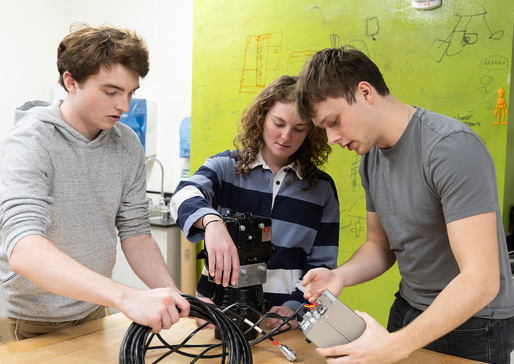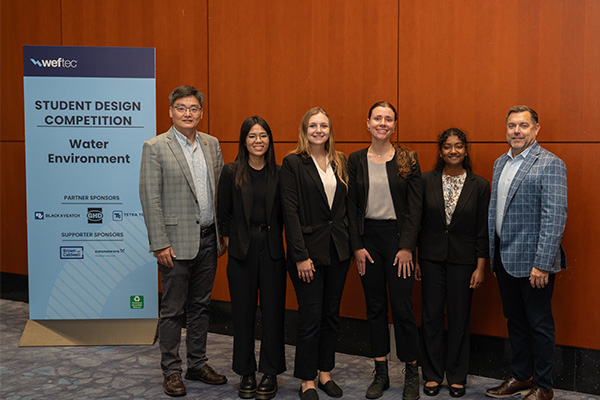WashU Satellite selected for federally funded spacecraft development program
Student group will receive $50,000, summer internships

WashU Satellite, a group established by students in the McKelvey School of Engineering, has been selected for the University Nanosatellite Program (UNP)’s Mission Concept 2025, a federally-funded spacecraft development program supporting small satellite projects at U.S. universities.
Mission Concept will allow WashU Satellite to collaborate with NASA - National Aeronautics and Space Administration, the Air Force Research Laboratory (AFRL), the United States Space Force and the Space Dynamics Laboratory to advance small-spacecraft technology. James Buckley, professor of physics in Arts & Sciences, is the principal investigator for the program.
Jack Galloway, a senior majoring in mechanical engineering; Krystal Carranza, a sophomore majoring in mechanical engineering; and Sophie Fendler, a senior majoring in physics in Arts & Sciences, will spend the summer working on the team’s VECTOR mission from the AFRL Space Vehicles Directorate on Kirtland Air Force Base in Albuquerque, New Mexico. VECTOR is WashU Satellite’s optical telescope CubeSat created for multi-messenger astronomy as well as control algorithm development and testing. The students will train alongside top engineers and scientists to gain valuable expertise in systems engineering and mission concept design. A $50,000 award will be used to cover travel and living expenses and may be used minimally toward the mission.
Established in 1999, UNP was the first federally funded program dedicated exclusively to university participation in spacecraft development. In 2023, the Mission Concept program was added to UNP through a partnership with NASA’s CubeSat Launch Initiative and Exploration Research & Technology.
The WashU Satellite team, founded in 2024 by Ben Cook, a senior majoring in electrical engineering, recently won the Outstanding Impact Award for its first research paper, “AIRIS: Pushing the Boundaries of GRB Optical Afterglow Observation,” published in the Washington University Journal of Undergraduate Research.
Click on the topics below for more stories in those areas
- Undergraduate Students
- Energy, Environmental & Chemical Engineering
- Mechanical Engineering & Materials Science
- Electrical & Systems Engineering



